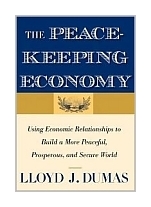|
||
• wydawnictwa polskie
• Zamów informacje o nowościach z wybranego tematu • kontakt
• Cookies na stronie |
THE PEACEKEEPING ECONOMYDUMAS L.J.wydawnictwo: YALE UP , rok wydania 2011, wydanie Icena netto: The Peacekeeping Economy:Using Economic Relationships to Build a More Peaceful, Prosperous, and Secure WorldThe idea that military strength is virtually synonymous with security is deeply entrenched and widely held. But while the threat or use of military force may sometimes be necessary, it cannot keep us as safe as we would be by building relationships that replace hostility with a sense of mutual purpose and mutual gain. Economic relationships, says Lloyd J. Dumas, can offer a far more effective, and far less costly, means of maintaining security. After defining the right kind of economic relationship—one that is balanced and nonexploitative, emphasizes development, and minimizes environmental damage—Dumas then addresses some practical concerns in establishing and maintaining these relationships. He also considers the practical problems of the transition from military-based security arrangements to "economic peacekeeping," and the effects of demilitarized security on economic development and prosperity. Lloyd J. Dumas is Professor of Political Economy, Economics and Public Policy at the University of Texas, Dallas. He lives in Carrollton, TX. Table of Contents
Preface ix Acknowledgments xiii Part 1 A New Paradigm for Achieving National and International Security 1 The Hopeful Science 3 2 Laying the Foundations 16 3 The Core Principles of Economic Peacekeeping 37 4 Making It Happen: Building a Peacekeeping Economy in the "Real World" 98 5 Making It Stronger: Organizations and Institutions 152 6 Does Globalization Contribute to Economic Peacekeeping? 205 Part 2 The Economics of Demilitarized Security 7 The Economic Promise of Demilitarized Security 251 8 Removing Barriers to Demilitarized Security: Managing the Transition 277 9 Extending Demilitarized Security: Economic Peacekeeping and Nonviolent Action 298 10 Demilitarized Security, Development, and Terrorism 320 Part 3 The Peacekeeping Economy 11 Bringing It All Together: Toward a More Prosperous and Secure World 347 Notes 367 Index 405 432 pages, Hardcover Księgarnia nie działa. Nie odpowiadamy na pytania i nie realizujemy zamówien. Do odwolania !. |


